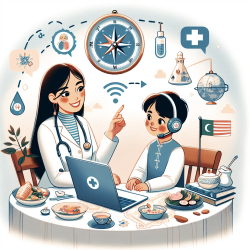Understanding the Crisis: A Data-Driven Approach
The ongoing conflict in Ukraine has created a dire situation for millions of children, posing significant threats to their mental health and well-being. As a practitioner, understanding the scope of this crisis and implementing data-driven strategies can significantly improve the outcomes for these vulnerable children. According to a recent study published in the European Child & Adolescent Psychiatry journal, at least 7.5 million children are at risk due to the ongoing military actions in Ukraine. This blog aims to explore the findings of this study and provide actionable insights for practitioners.
The Impact of Conflict on Children's Mental Health
The conflict in Ukraine has exacerbated the mental health challenges faced by children. The study highlights that 50% of parents observed a deterioration in their children's mental health since the onset of the war. Common symptoms include mood swings, increased anxiety, sleep disorders, and aggression. These findings underscore the urgent need for practitioners to adopt a coordinated and safe response to address these issues effectively.
Implementing Data-Driven Strategies
As practitioners, it is crucial to utilize data-driven strategies to address the mental health needs of children affected by the conflict. Here are some actionable steps based on the study's findings:
- Strengthen Child Protection Systems: Collaborate with local authorities and international organizations to enhance child protection mechanisms. This includes expanding emergency care arrangements and facilitating family reunification processes.
- Promote Inter-Agency Collaboration: Encourage collaboration between child protection, education, and mental health services to create a holistic support system for affected children.
- Implement Trauma-Informed Care: Provide training for practitioners in trauma-informed care to better address the psychological impact of conflict on children.
Encouraging Further Research
While the current study provides valuable insights, further research is essential to develop more effective interventions. Practitioners are encouraged to engage in research activities and collaborate with academic institutions to explore innovative solutions for improving mental health outcomes for children affected by conflict.
Conclusion
The mental health crisis among children affected by the Ukraine conflict calls for immediate and coordinated action. By implementing data-driven strategies and fostering collaboration among various stakeholders, practitioners can make a significant impact on the lives of these vulnerable children. To read the original research paper, please follow this link: Advocacy for a coordinated and safe response for the mental health and psychosocial needs of children affected by the conflict in Ukraine.










